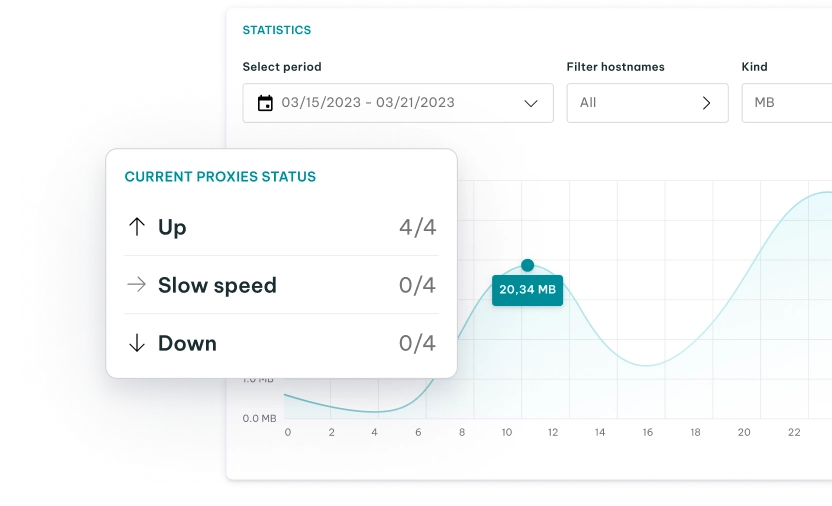10 Best Residential Proxy Providers in 2026
Software comparisons

Justas Palekas
Key Takeaways
-
Look into the proxy pool quality and quantity, targeting options, rotation, protocol support, and pricing when choosing a suitable residential proxy provider.
-
Proxy providers like IPRoyal, Decodo, and MarsProxies are consistently ranked best in terms of features and pricing.
-
Comparing pricing requires knowing your bandwidth or IP needs and calculating which provider offers the best effective cost for your demand.
Residential proxy is known for the legitimacy of its IP addresses. Hosted on physical devices, such as laptops, and using ordinary internet service providers, residential proxies ensure you blend in with the crowd. They are the best choice for web scraping, ad verification, and many other high-privacy tasks.
Finding a reliable proxy provider is no easy feat. Real internet users must agree to enter a residential proxy network, granting their IP addresses. That’s why residential proxies are expensive and often include session or bandwidth limits. We’ll make the choice easier for you by listing the top ten residential proxy service providers.
How to Choose the Right Residential Proxy Provider
All top residential proxy providers balance quality and affordability in some way. While the price fluctuates based on current deals and the amount you are buying, there are certain quality factors of residential proxies you should always consider.
- The residential proxy pool should be reasonably sized since it ensures your success rate in some tasks, but it’s not necessarily a signal of the quality of residential IPs. Often, smaller pools are more carefully vetted.
- Targeting options include location coverage and geo-targeting methods (zip code, city-level, country, etc.).
- Residential IP address rotation defines whether rotating residential proxies are available, how they are rotated, and if you can keep residential IPs for longer.
- Protocol support is crucial for knowing whether the proxies will fit your use case. The most commonly used are HTTP(S) and SOCKS5 protocols.
Besides pricing, these are the main factors you should consider before purchasing residential proxies. More difficult-to-measure aspects, such as brand credibility, proxy service reliability, and unique features, should also play a role in your decision.
Consider choosing one of the residential proxy types first before looking into providers. Different parameters of proxies might impact the success rate of your web scraping, geo-targeting, automation, or other tasks. Providers covering the most use cases with their residential proxy selection top our list.
Top 10 Residential Proxy Service Providers
1. IPRoyal

- Proxy pool size: Over 34 million ethically sourced premium IPs in 195+ countries.
- Targeting options: Country, state (zip code), and city-level residential IPs.
- IP rotation: New IP on each request or a sticky residential proxy for up to seven days.
- Supported protocols: HTTP(S) and SOCKS5 support.
- Pricing: Multiple plans based on IPs or bandwidth, as well as a pay-as-you-go option with frequent discounts.
IPRoyal is a leading proxy service provider well known for some of the fastest residential proxies on the market. You can choose between static residential proxies with unlimited bandwidth or rotating residential proxies with unlimited sessions. Standing out with excellent customer satisfaction and competitive pricing, IPRoyal delivers everything needed for most proxy uses.
2. Bright Data
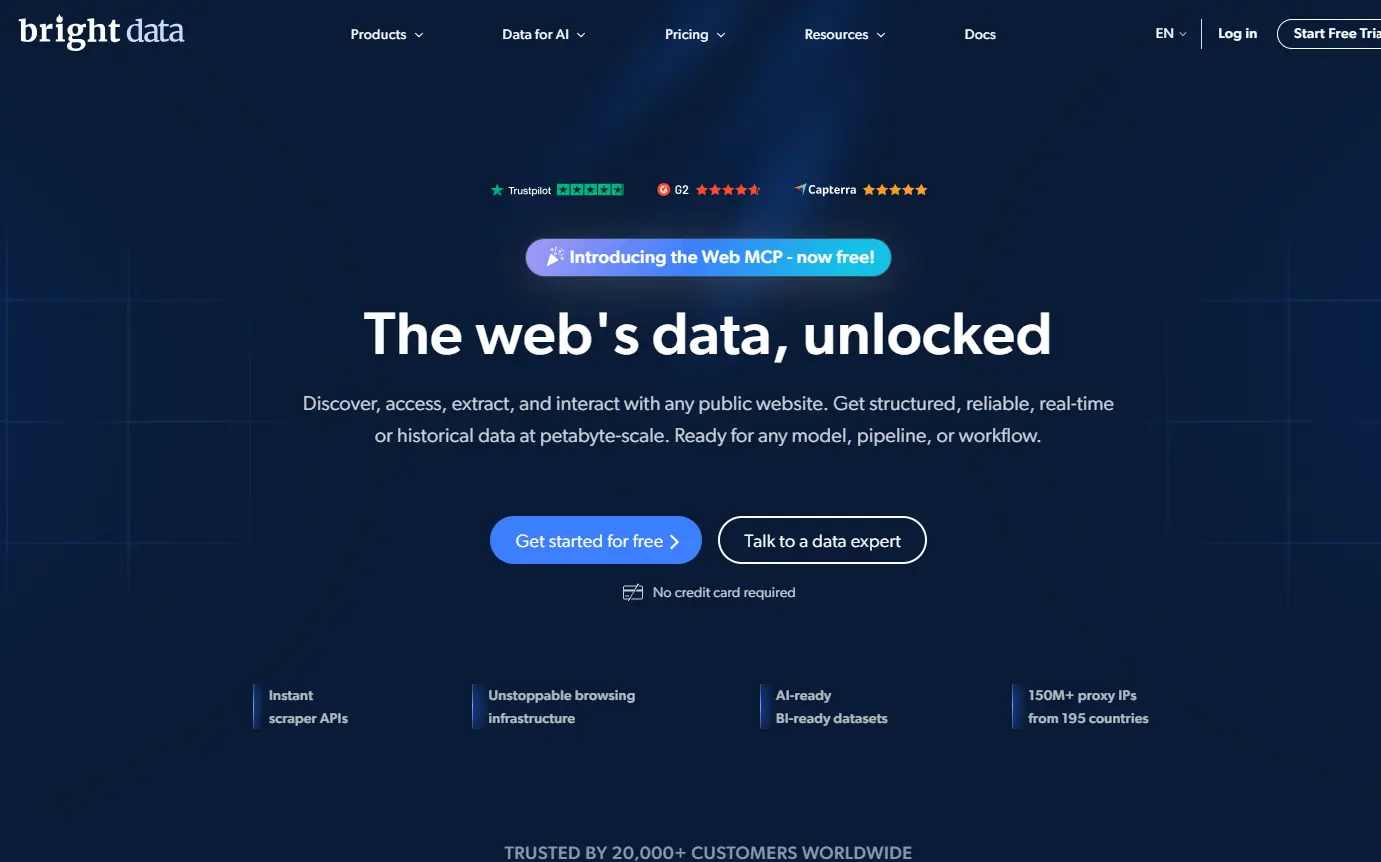
- Proxy pool size: 150+ million residential IPs from 195 locations.
- Targeting options: Country, zip code, and city-level targeting.
- IP rotation: Auto rotation or a smaller pool of sticky proxies until the session ends.
- Supported protocols: HTTP(S) and SOCKS5.
- Pricing: Three plans based on bandwidth purchased and a pay-as-you-go option.
Bright Data is best known as a data collection company that offers some competitive residential proxies. Their web scrapers and APIs are some of the best in the market, but it often means you might pay a premium price for not necessarily premium residential proxies.
3. Oxylabs

- Proxy pool size: Over 175 million residential IPs.
- Targeting options: Geo-targeting by country, city, state, and zip code.
- IP rotation: Automatic rotation or sticky sessions for up to 24 hours.
- Supported protocols: Supports HTTP(S) and SOCKS5.
- Pricing: Three residential proxy subscription options and a separate pay-as-you-go model.
Oxylabs is one of the most hyped brands in the current residential proxy market. While their large residential proxy pool performs well more often than not, it justifies the high pricing only in rare cases. Such as when exhaustive marketing and non-essential features that come with proxies are the most important.
4. MarsProxies
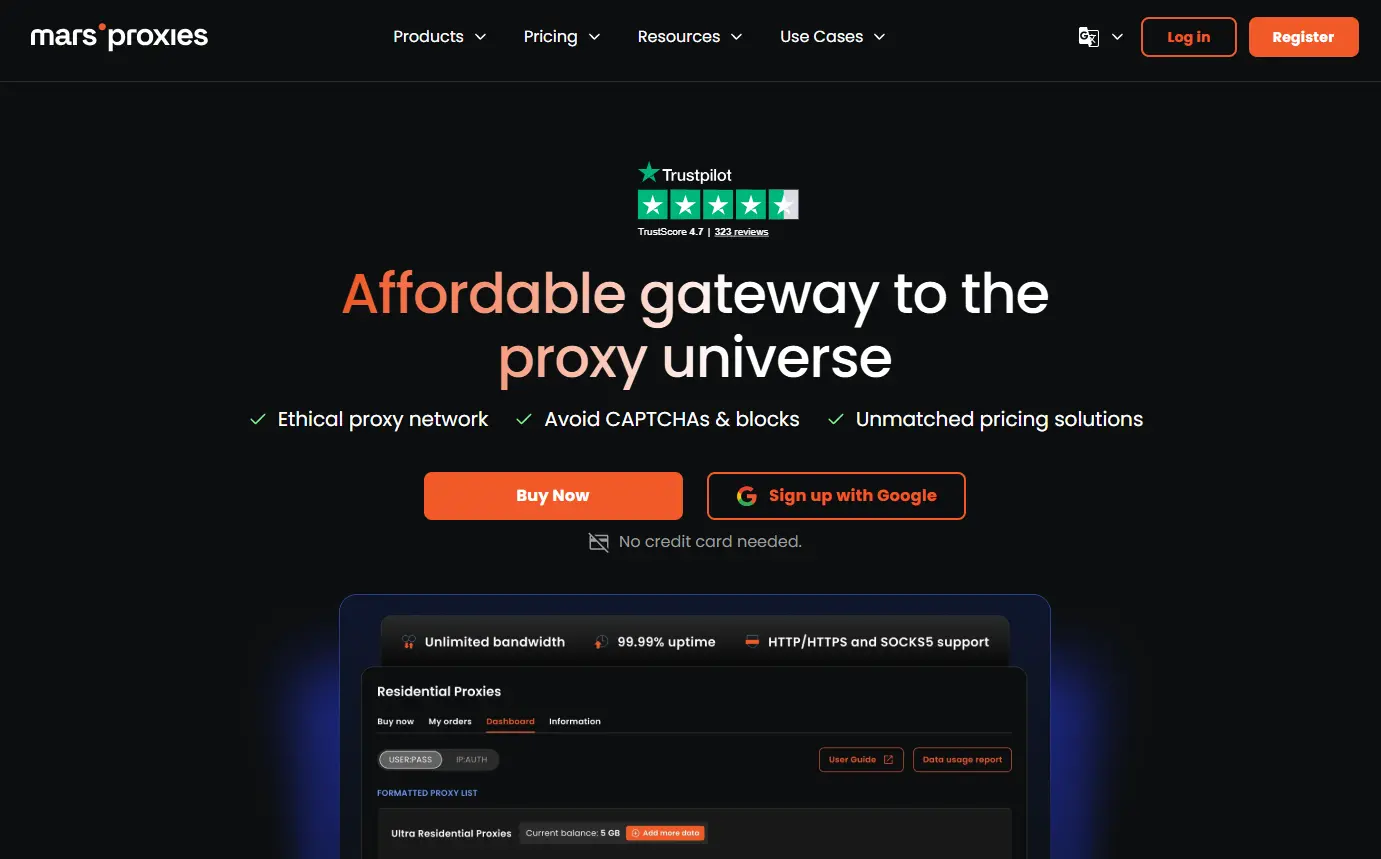
- Proxy pool size: Over a million residential IPs in 190+ countries.
- Targeting options: City-level targeting capabilities.
- IP rotation: Custom rotation or sticky sessions from a few seconds to up to a week.
- Supported protocols: HTTP(S) and SOCKS5.
- Pricing: Flexible pricing plans based on bandwidth purchased.
MarsProxies offers some of the most affordable residential proxies you can find while keeping up with the most important features. Their custom rotation and sticky IP options rival industry leaders. There’s a lot of room for improvement, but MarsProxies deserves praise for accessibility to beginner proxy users.
5. Smartproxy (now Decodo)
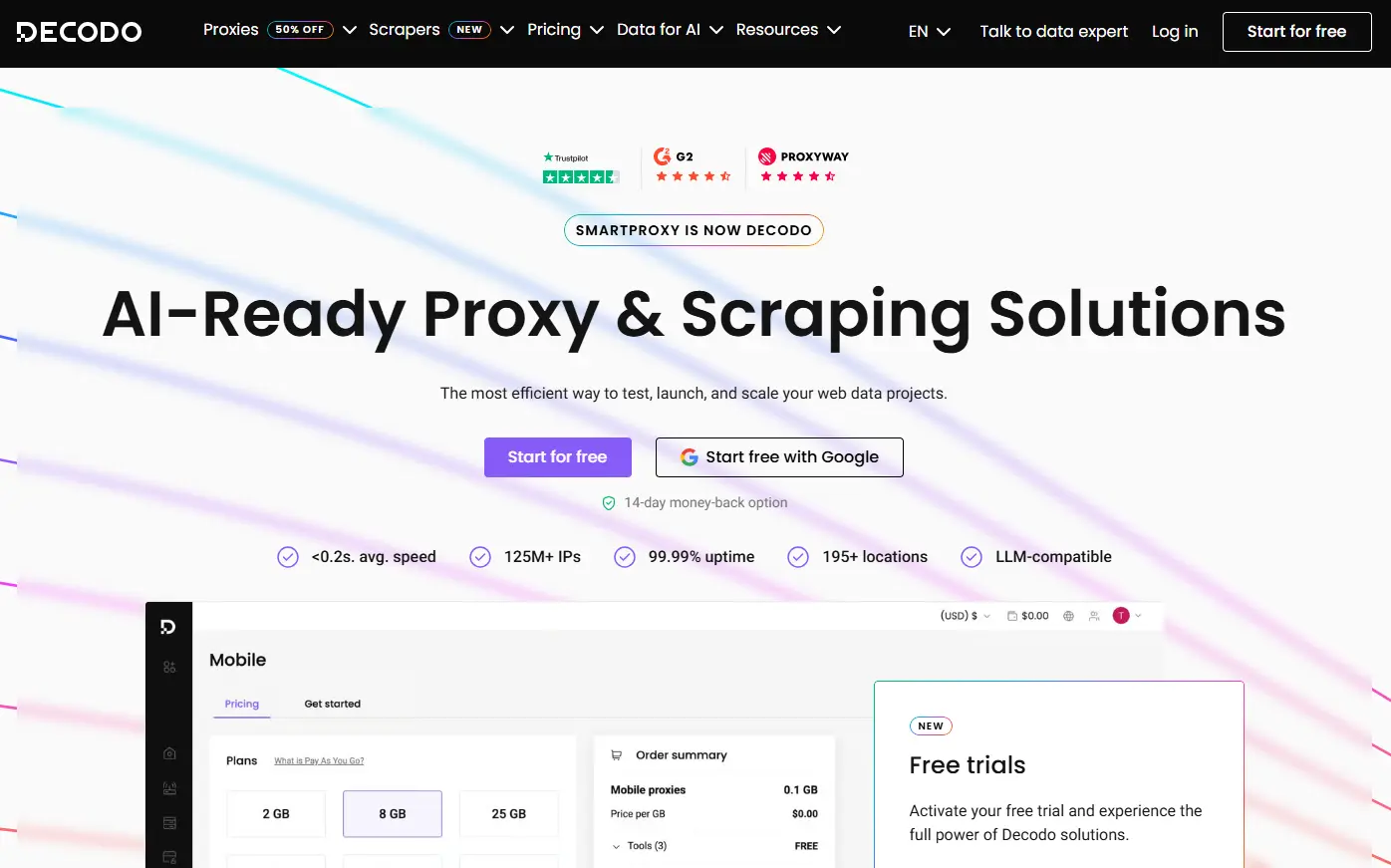
- Proxy pool size: 125+ million residential IPs across 195+ countries.
- Targeting options: Country, state, city, and ZIP code geo-targeting.
- IP rotation: Automatic rotation or short, up to 30-minute, sticky sessions.
- Supported protocols: Supports HTTP(S) and SOCKS5.
- Pricing: Subscription models based on bandwidth limitations and a separate pay-as-you-go model.
Smartproxy provides a large pool of IPs with some decent performance and location capabilities. Their residential proxies cost quite a lot, especially if you want to pay on a per-IP basis. Yet, their residential proxy pool is quite popular among proxy users looking for providers with IPs from decent internet service providers.
6. NetNut

- Proxy pool size: 85+ million IPs in 195 countries.
- Targeting options: City or state selection.
- IP rotation: Rotates IPs for each connection or request, unless you buy from a smaller static residential proxy network.
- Supported protocols: HTTP(S) and SOCKS5.
- Pricing: Six plans you can pay for annually or monthly.
NetNut has a large pool of various proxy servers, including some decent residential proxies. You’ll likely find all you need in their informative and convenient dashboard. What some users complain is missing is a good value for money, as NetNut might be the most expensive proxy provider on the market.
7. Rayobyte

- Proxy pool size: 40+ million IP addresses.
- Targeting options: Country, state, and city-level targeting.
- IP rotation: IP rotation and support for sticky sessions for up to two hours.
- Supported protocols: HTTP(S) and SOCKS protocols.
- Pricing: Four pricing plans with separate enterprise offers.
Rayobyte attracts customers with its competitive pricing and customer-oriented approach. Yet, some reviews complain about the lack of easy-to-follow documentation and straightforward answers about technical details, such as protocol support or the size of the residential IP pool. Rayobyte is still worth considering for its success rate with common data collection tasks.
8. Webshare
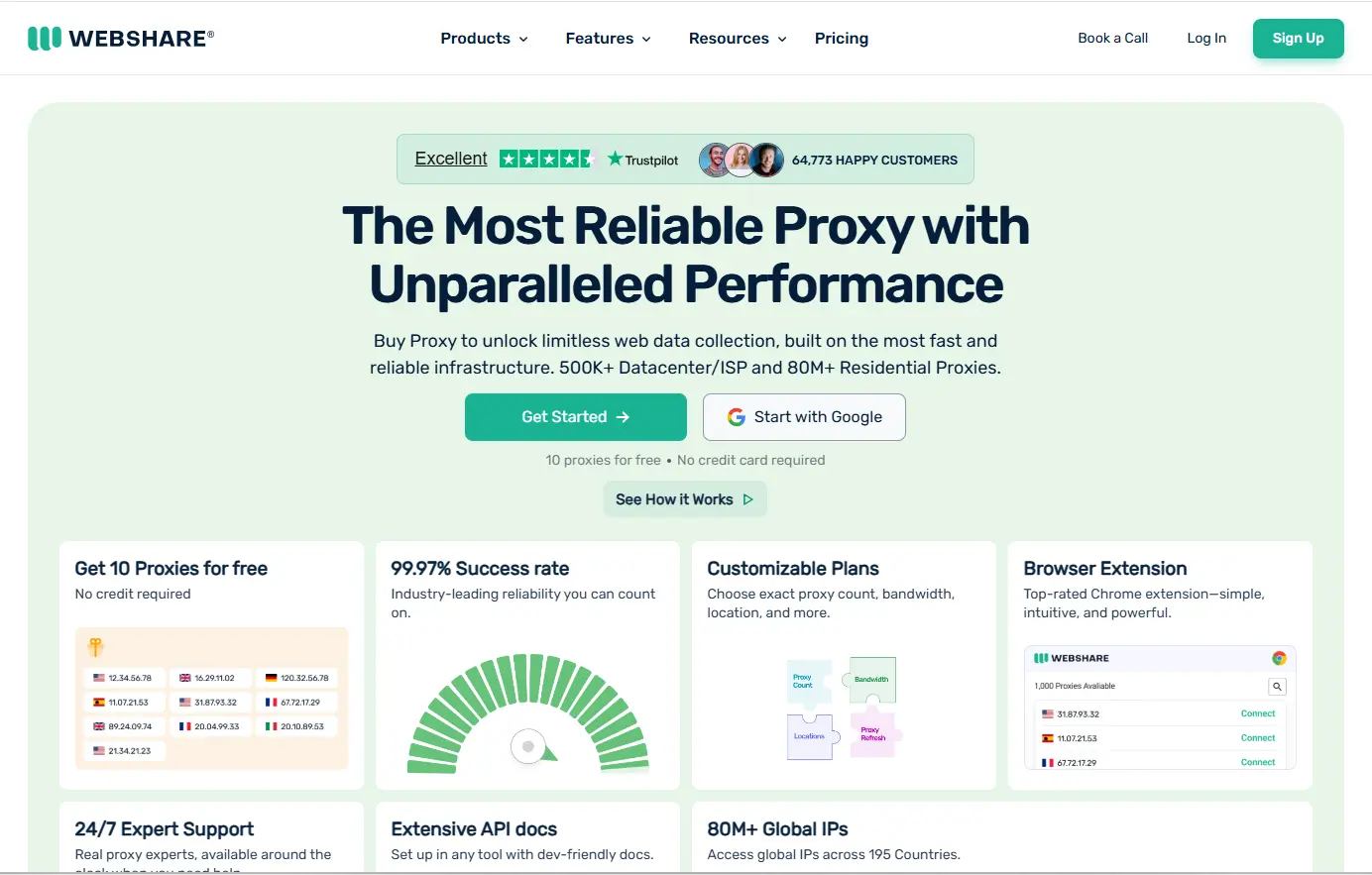
- Proxy pool size: Over 80 million residential proxies in 195 countries.
- Targeting options: Country-level targeting only.
- IP rotation: Automatic rotation every five minutes, but static options are available too.
- Supported protocols: HTTP(S) and SOCKS5.
- Pricing: Pricing plans are based on the amount of IPs purchased.
Webshare is best suited for small to medium-sized use cases due to its pricing model. Lack of targeting options, custom rotation, and limited customer support keep these residential proxies low on our list. Yet, their pricing strategy occasionally offers some of the best prices for individuals.
9. Infatica
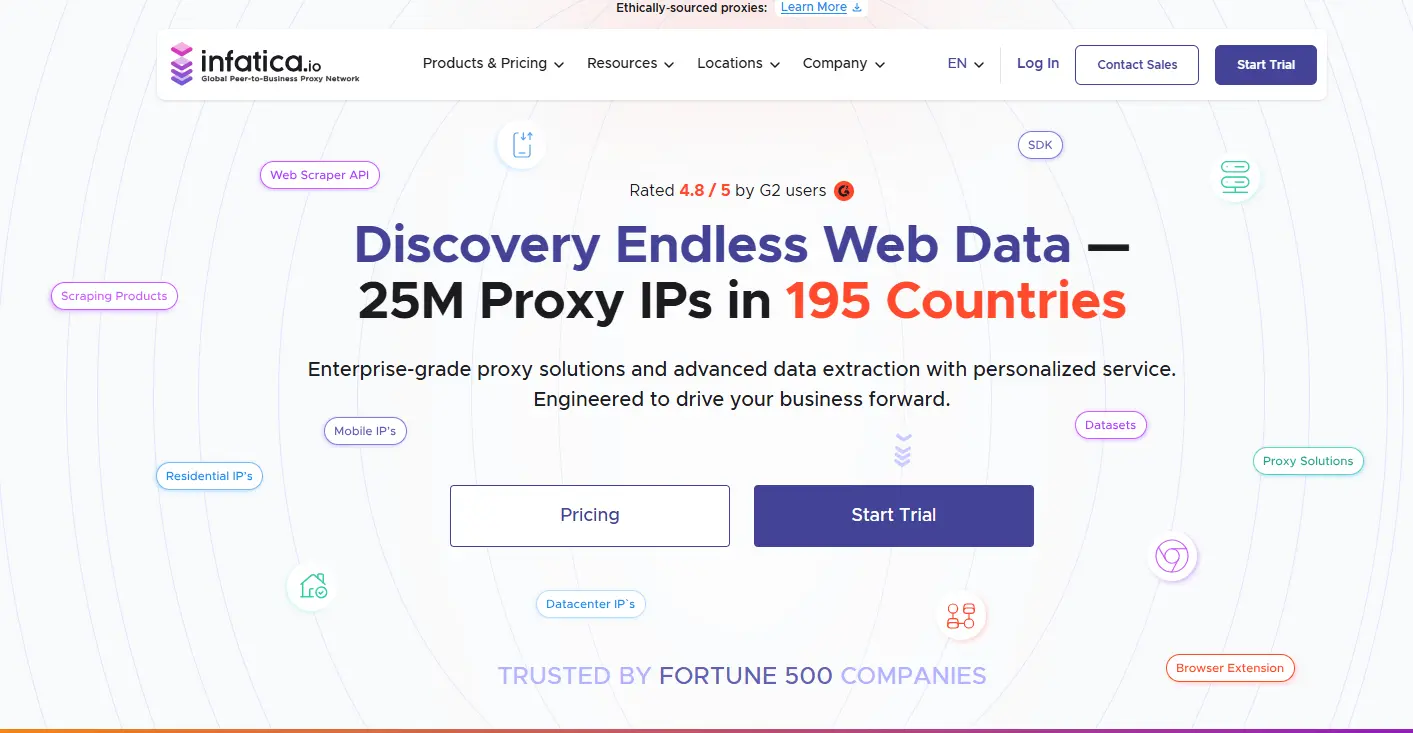
- Proxy pool size: Over 20 million IPs in main regions worldwide.
- Targeting options: Country, city, and postal code-based targeting.
- IP rotation: Customizable rotation from intervals of up to an hour or a sticky option.
- Supported protocols: HTTP(S) and SOCKS support.
- Pricing: Various options based on bandwidth and a pay-as-you-go option.
Infatica residential proxies are known for good success rates in business use cases where unlimited threads are important. However, it lacks locations and some of the usual features, such as a browser extension, which makes it difficult to apply in many scenarios besides the few most common ones.
10. SOAX
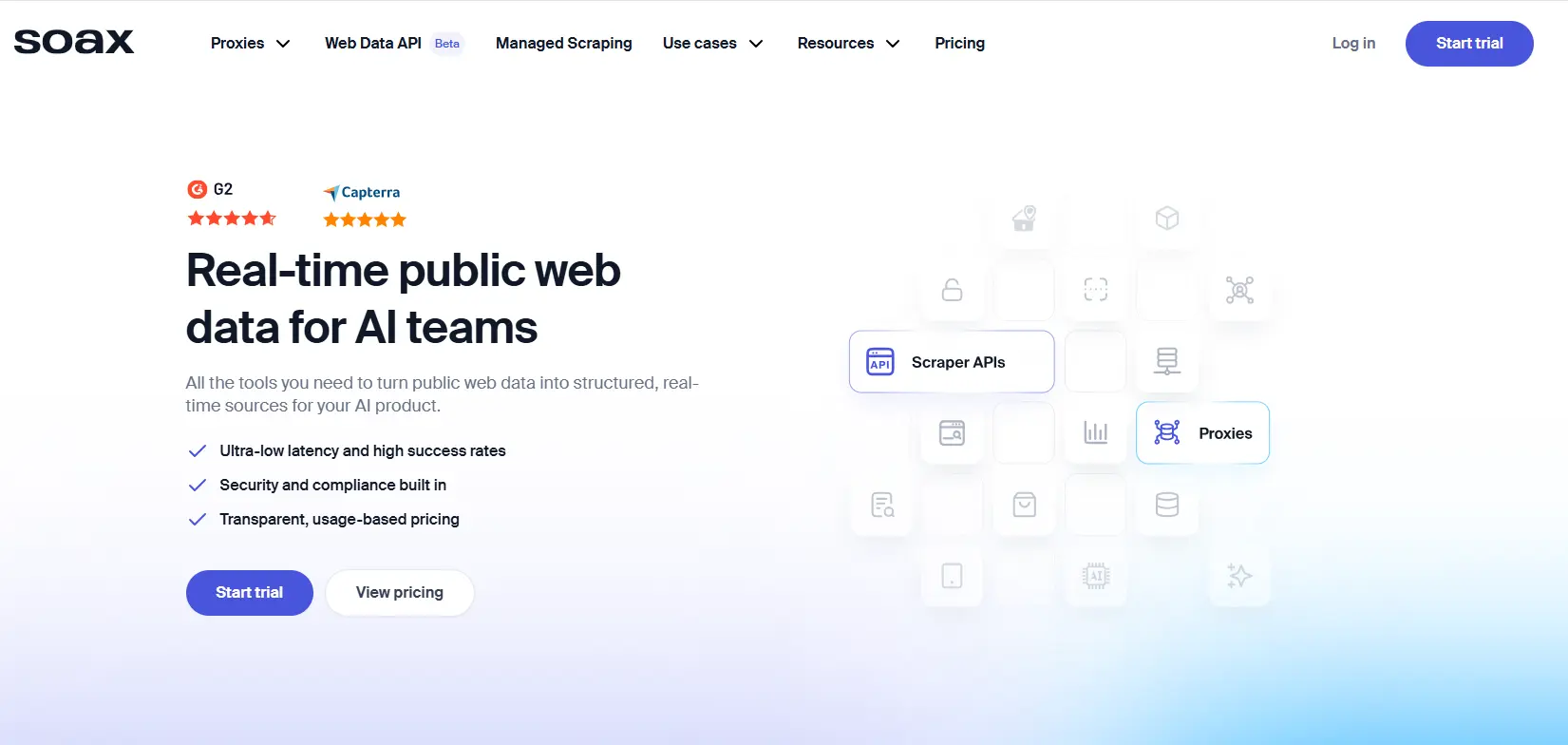
- Proxy pool size: Over 191 million IPs from 195 regions.
- Targeting options: City-level targeting.
- IP rotation: Sticky or rotating sessions.
- Supported protocols: HTTP, SOCKS5, UDP, and QUIC.
- Pricing: Four plans priced based on bandwidth, and a pay-as-you-go option.
SOAX offers decent residential proxies and data collection solutions aimed mostly at business use cases. Small-scale projects will find SOAX a bit too expensive, as prices start to get affordable only with higher bandwidth plans. Yet, their support staff and success rate at business tasks make SOAX worthy of mention.
Cheapest Residential Proxy Providers
Even after you weed out unreliable providers, pricing comparison still faces a challenge of different pricing models. Some have hidden expenses, while offering one-time promotions, others become affordable only when you buy enterprise-level bandwidth, and only a few offer straightforward pricing.
In a realistic scenario, one wouldn’t buy a terabyte of bandwidth just to get a good price per GB for residential proxies. So, we’ll compare 10 GB bandwidth plans (or closest equivalents) for residential proxies with monthly subscriptions. The data was collected from residential proxy provider websites in September 2025.
| Provider | Monthly Cost | Cost per GB | Effective Cost per 10GB |
|---|---|---|---|
| IPRoyal | $26.30 | $2.63 | $2.63/GB |
| Webshare | $27.50 | $2.75 | $2.75/GB |
| Rayobyte | $35.00 | $3.50 | $3.50/GB |
| MarsProxies | $44.90 | $4.49 | $4.49/GB |
| Oxylabs | $50.00* | $3.87* | $5.03/GB |
| SmartProxy | $65.00* | $2.60* | $6.50/GB |
| SOAX | $90.00* | $3.60* | $9.00/GB |
| Infantica | $96.00* | $3.84* | $9.60/GB |
| NetNut | $99.00* | $3.53* | $9.88/GB |
| BrightData | $499.00* | $3.50* | $49.35/GB |
1. IPRoyal
- $26.30 monthly total
- $2.63 per GB
- Effective cost per 10GB - $2.63/GB
IPRoyal offers the best raw deal for exactly 10GB of residential proxies. Other plans, such as pay-as-you-go, are also straightforward and affordable for covering the needs of small to medium-sized projects.
2. Webshare
- $27.50 monthly
- $2.75 per GB
- Effective cost per 10GB - $2.75/GB
Webshare has a simple 10GB plan at a bit higher price. The costs of using Webshare scale well, but there is no pay-as-you-go option for a quick start.
3. Rayobyte
- $35.00 monthly
- $3.5 per GB
- Effective cost per 10GB - $3.5/GB
Rayobyte prices all plans from 1 to 49GB at the same $3.50/GB, which makes a 10GB commitment predictable. It’s a good mid-tier choice.
4. MarsProxies
- $44.90 monthly
- $4.49 per GB
- Effective cost per 10GB - $4.49/GB
MarsProxies charges a flat fee of $4.49/GB in the range of 5 to 19 GB plans. So, a 10GB plan is priced quite competitively with room to scale your operations.
5. Oxylabs
- $50 monthly
- $3.87 per GB
- Effective cost per 10GB - $5.03/GB
Oxylabs’ closest offer is 13GB of residential proxies for $3.87 per GB. Such overpayment could be worth it if the GB price were more competitive. The next plan of 40GB costs a high $3.75 per GB as well.
6. SmartProxy (Decodo)
- $65 monthly
- $2.60 per GB
- Effective cost per 10GB - $6.50/GB
You’ll need to buy at least a 25GB plan to cover 10GB of residential proxy bandwidth, which inflates the actual cost per GB. If you want to avoid overbuying, their pay-as-you-go option with $3.5 per GB might seem a little better.
7. SOAX
- $90 monthly
- $3.60 per GB
- Effective cost per 10GB - $9.00/GB
SOAX’s minimum plan starts at 25GB, which penalizes small-time buyers. Prices get better with more GB bought, but the same can be said for all providers.
8. Infantica
- $96 monthly
- $3.84 per GB
- Effective cost per 10GB - $9.60/GB
The effective cost is high for 10GB buyers, and the $4 per GB pay-as-you-go plan does not make it more economical when you don’t want to commit to terabytes of bandwidth.
9. NetNut
- $99 monthly
- $3.53 per GB
- Effective cost per 10GB - $9.88/GB
The 28 GB minimum of NetNut pushes per-10GB cost up to nearly $10 per GB. The affordability gets somewhat better if you commit to an annual plan.
10. BrightData
- $499 monthly
- $3.50 per GB
- Effective cost per 10GB - $49.35/GB
BrightData is an enterprise-first provider with a minimum 141GB residential plan and competitive pricing closer to a terabyte. There’s a pay-as-you-go plan for $4.00 per GB of residential proxies, but it’s still relatively expensive.
Conclusion
In the end, the best residential proxy service provider is the one that fits your needs the most. We believe that a large residential proxy pool with unlimited bandwidth and affordable prices will cater to most users. Feel free to try out our residential proxies and see for yourself.
FAQ
Are residential proxies legal?
How do I set up a residential proxy?
Residential proxies are set up just like any other proxies. Once you choose a provider and purchase a subscription, obtain proxy credentials and enter them into the needed software. This can be your operating system, web browser, or any other special software that supports residential proxies.
Can residential proxies be detected?
While residential proxies are the most difficult to detect, websites or bad actors might still detect them. For example, your identity might still be established through browser fingerprinting or DNS leaks. Residential IP addresses might also be banned if the user doesn’t take precautions, such as limiting the number of requests sent.
Are residential proxies safe?
Yes, as long as you are using a reputable residential proxy provider. Illegitimate proxy providers may sell your data or even spread malware. Established providers also source residential IPs through legitimate sources, so using residential proxies will be safe from legal concerns as long as your residential proxy use case is legal.
What is the difference between a residential VPN and a residential proxy?
Both residential Virtual Private Networks (VPNs) and residential proxies use residential IP addresses. Residential VPNs use encryption by default but are much less adaptable to different use cases, such as web scraping. Residential VPNs are better for general tasks like browsing or streaming, while residential proxies excel at more advanced tasks.
